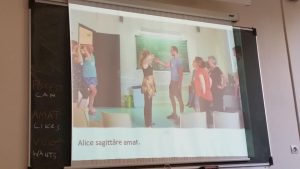Welcome back for those teachers who are already back to school! And even for those who aren’t yet, this post should be of great help to start the school year!
Last week, I was telling you about my first takeaway from #Agen2019: Very Narrow Listening presented by Judith Dubois (who also happens to run the conference). It struck a chord because I strongly believe LISTENING is the KEY to acquire a language AND to succeed in life!
My second takeaway is strongly linked with Listening.
Card Talk
I got to experience Card Talk being a learner in Justin Soclum Bailey Latin class. Justin started on the first day by asking us, the learners, to draw or write down on a sticky note something we enjoyed doing.
How best to start a whole week of Latin class? Magister Justin showed us from the start he wanted to get to know us first. He was genuinely interested in us as people.
When he had collected all the sticky notes, he picked some of them and he asked questions to the people concerned, about what they liked to do. Not only, was the teacher interested in their learners, the learners were also getting to know each other.

Alice likes to shoot arrows!
HOWEVER, Magister Justin never, at any point during the week, forced us to speak in Latin! There was NO forced output during the class. The teacher would always repeat and rephrase what the learner wanted to say. The objective was to know the class and to give comprehensible input.
Card Talk is very well explained by Martina Bex here. It doesn’t need tons of preparation and it is the best way to start the school year when you already feel overwhelmed with all the resources and activities out there!
Genuinely know your learners
I don’t teach in a school anymore but I do teach online mostly one to one. First, when I start a session, I want to know how the learner feels. We have a genuine conversation about feelings, the weather… Exactly as we would do in real life!
For example, just today, we started to have a natural conversation with a beginner learner. She told she was tired in English. I asked her: ” Pourquoi tu es fatiguée ce matin ? ” and she answered in English that she hadn’t slept enough. So I rephrased in French: ” Tu n’as pas suffisamment dormi, n’est-ce pas ? ” and I wrote ” suffisamment ” on the board as I was spelling it. Then I asked her: ” Pourquoi tu n’as pas suffisamment dormi ? ” and she explained she didn’t sleep at her house but at a friend’s house. So there came the chance to have ” chez moi / toi / ton ami ” on the board. I didn’t plan this, the conversation just happened and it was NATURAL.
After this “small talk”, I told the learner the story of Goldilocks and the Three Bears. I did Story Listening of Boucle d’Or et les trois ours (Find the simplified version of on the Great Story Reading Project) which was perfect because the learner already knew the story in English and since she was tired, she found it easier to understand the story.
Story Listening is the CORE of all my lessons but first I want to genuinely know my learners and have small conversations with them with NO forced output.
En pratique
Whether you are new to teaching Comprehensible Input or not, here is my routine:
Start by asking your learners how they feel. You can use these free downloadable cue cards (on Modolinguo Website) to help you ask questions to your students: Comment ça va ? & Mon humeur du jour
Do one Story Listening to give your learners Optimal Input from Day 1 and also to train them to listen with the intend to understand the story (not all the details of the story).
Tell them a short story (10 minutes max) like the fable of L’oie aux oeufs d’or or La grenouille et le boeuf (All stories are on The Great Story Reading Project):
Ask you learners to draw, write in L1 what they understood from the story. Your learners keep this in a portfolio with all the stories they will have listened to throughout the year.
THAT’S IT! No need to do tons of different activities and to tire yourself and the students!
If you need to give your learners homework, give them something to read like this fun story about Maxine (downloadable in pdf file here) and to listen to here:
What do you think? What is your routine with your learners?
P.S. To have access to many French stories (like the above one), biographies, poems and articles to read (with a Dyslexic mode) as well as the audio files for as little as 4.75EUR/month, join now!
P.P.S. The eBook (pdf) about the adventures of Marie et Médor avant Noël is on its way! 24 scripts in the present and in the past tense to be dowloaded SOON!
Read about Agen Takeway #1: Very Narrow Listening

